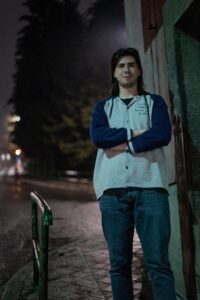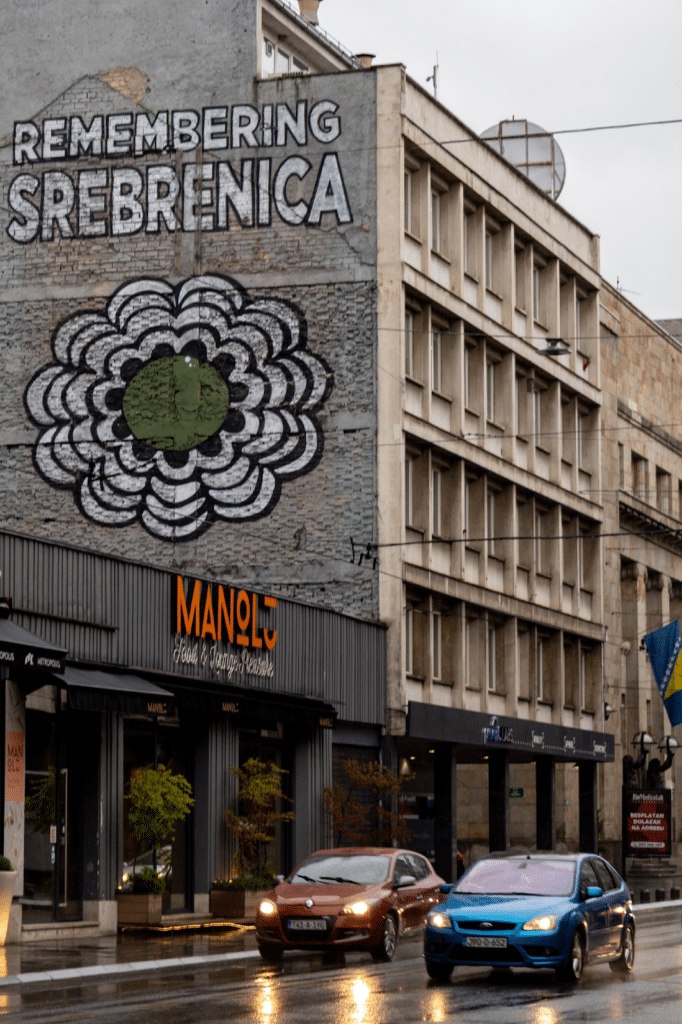photo: Main street in Sarajevo - Srebrenica is still a point of polarisation in the country (created by Renée Spees)
In early October, the Bosnian Serb parliament approved a bill on compulsory registration of non-governmental organisations (NGOs) with foreign backers in a special register managed by the Justice Ministry. The so-called 'foreign-agent law' allows Republika Srpska to criminalise NGOs for links with foreign countries. Yet another example of nationalist politics by the Serbian entity in Bosnia and Herzegovina - the Republika Sprska. Yet the European Union (EU) in December last year decided to make Bosnia and Herzegovina a candidate member of the EU. Why do the European Union's priorities not lie in solving the structural problems, instead of giving hollow symbolic gestures?
Banja Luka, Republika Srpska, Bosnia and Herzegovina. Under the smoke of Srpska's parliament is the headquarters of Ostra Nula, Serbian for: 'the sharp idlers', a political-activist organisation working for human rights, women's emancipation and lhbtq+ rights. Chairwoman Milica Pralica and Tamara Miščević look combative despite threats and political repression from the government of Milorad Dodik, the Bosnian Serb president. Nevertheless, they want to continue to engage with marginalised groups within the entity. "During the Women's March on 8 March, I and a colleague were attacked by a bunch of hooligans because we were walking with rainbow flags" says Milica. "We are also regular victims of cyber attacks they try to hack our mail accounts or send threats on social media."
"The political parties currently governing benefit most from this status quo"
"Many times it is said that we are anti-Serbian or even a terrorist organisation," continued them. Asked where they see themselves in five years, Milica replies with a serious face: "in prison". Then they burst into laughter. "Here in Bosnia, we like black humour," continues Tamara, "it is our way of dealing with the pain and traumas that mark our present and past". They have had to stop all future demonstrations and social activities like the lhbtq+ poetry night because of the threats. The 'foreign agent law' will also have major consequences for them. Should the law be passed, Milica and Tamara do not know whether the organisation can continue to exist.

(Photo right) Milica and Tamara joked: this is the only remaining rainbow flag in Banja Luka after hooligans took away all the flags at the demonstration on international women's day (Ostra Nula) (created by Renée Spees)
A difficult peace
According to the International Labor Organisation (ILO), Bosnia's economy is recovering faster than expected after the corona pandemic. The unemployment rate is also falling, though youth unemployment was high at 35 per cent. On corruption, the country scores poorly with a 110the place on the global corruption index. Also, Bosnia and Herzegovina, along with many other central and eastern European countries, suffers from eand of the fastest declining populations in the world, According to a UN report last year.
"If a tour guide decides to leave then more work is left for me"
The history of 28 years of peace in Bosnia is characterised by a strong division between the three main ethnic groups. From the national flag designed by a Spaniard, to the ethnic nationalist partitioning of the provinces and federal states. The three entities all have their own government agencies; think postal services, electricity grids. They also get to set their own school curricula determine, a hard-won compromise for the Serbian entity, a legacy of the 1990s peace treaty. Politically, Bosnia leans heavily on this peace treaty. Almost 30 years later, the country still has no constitution and the Dayton Treaty is de facto used as such. Thanks to the complicated construction of the peace treaty, Bosnia is considered one of the most complicated democracies in the world.
"one High Representative, two federal states, three national presidents, 14 parliaments and just over three million Bosnians"
By the EU, one Hoge Ver representative with the power to introduce laws by decree and to exclude people from the national parliament, the so-called 'Bonn Powers'. Two federal states, three national presidents, 14 parliaments and just over three million Bosnians. Since this year, the Federation of Bosnia and Herzegovina has had a government again after eight years, but cooperation between the Croats, Bosniaks and Serbs is still as awkward as it was during the war. Although forbidden by law to deny the genocide, President Dodik continues to do so. Eleven July this year, the day of the Srebrenica genocide commemoration, a Bosnian Serb student at the University of Sarajevo posted another picture of General Ratko Mladic convicted of genocide and war crimes with the text: "Condemned to immortality. You were and remain our hero. Long leve the general". Her punishment? She was offered a scholarship at the University of Belgrade by the Serbian government.
The High Representative as scapegoat
Bosnia's political situation is problematic, complicated and above all unchanged since the war. The Hoge Ver representative has failed to bring meaningful change in 28 years. The EU seems to have forgotten why it ever decided to help Bosnia. Yet last December, the EU decided to make Bosnia and Herzegovina a candidate country. However, on the 14 points needed to actually join the EU However, the country scores sadly low. Reports to the United Nations over the past eight High Ver representatives are full of complaining about the poor cooperation between the three entities. Exemplary of the High Representative's frustration is the tantrum of the current Hoge Ver representative to a number of journalists during a press conference in Goradze last year.

(Photo right) Fariz, City Guide in Sarajevo (created by Renée Spees)
When asked whether Bosnia should join the European Union, several people in the country react sceptically. Dajana Umičević until recently working for the NGO Youth for Peace, calls it a "double-edged sword". "The future prospect of joining one of the most internationally influential organisations in the world, with all the economic benefits associated with them, is positive. On the other hand, a large part of the population is against joining for many and varied reasons." Bosnian Serbs think joining NATO, linked to the European integration debate, is a no-go, according to Dajana. "Many Serbian Bosnians still remember the NATO bombing that is a trauma you don't forget so easily". Three young activists from Tuzla Revolt, a student organisation working to increase youth involvement in politics from the federation of Bosnia and Herzegovina, see the role of the High Representative becoming less and less meaningful. Edna Sadiković, the chairwoman, says: "The role of the High Representative has a lot of potential because its sole purpose is to guide the process of reconciliation in Bosnia and Herzegovina. I think the goal has been lost sight of halfway, because the political parties that are currently governing benefit most from this status quo. As a result, the High Representative is being used as a scapegoat".
Young people remain positive and hoopful
Nikola, he wishes to remain anonymous, a young entrepreneur from Banja Luka, put the Bosnian situation as follows: "it is like living in an infinite state of temporality. The war is over, but reconciliation between the warring parties has never taken place. let alone a national dialogue". Still, he remains hopeful. Nikola has this year launched his own graphic design started a small business and hopes to employ young Bosnians so that they too can make a living here. A positive note in the face of negative reports of young people leaving Bosnia. Mirella Šukur, from Sarajevo, also sees opportunities after her master financial management make a living. "In recent years I have noticed that companies are coming more and more to Bosnia and creating jobs, especially after I started working for AIESEC, the largest student organisation in the world," he said. "As long as you have the skills and knowledge, you can find a job here that allows you to stay."
"We live in an infinite state of temporality. The war is over, but reconciliation between the warring parties has never taken place"

Mirella (pictured left): Masters student in financial management, at a café on Sarajevo's main street (taken by Renée Spees)
Also in Sarajevo, Fariz Ablaković also sees opportunities to stay in the city - in addition to his studies, he works in a hostel. He runs tourists around on various tours through the city. "One of my goals is to write a manual for tour guides and open my own agency. The best way that I can help my country is to be someone the country is proud of, which is why I show tourists around. I am an ambassador for my country, my city". Asked why he doesn't leave, he laughingly says: "If a tour guide decides to leave then more work is left for me". Both Fariz and Mirella cite the right to be oneself as the most important conditions for remaining in Bosnia.
The future of Bosnia and Herzegovina remains uncertain. Lack of national dialogue for reconciliation, political impasses and corruption remain gripping the country. As long as the Bosnian Croats, Bosniaks and Bosnian Serbs refusing to cooperate with each other continues to paralyse political decision-making. Although the EU is less than a three-hour drive from Sarajevo, it feels as if, politically, the country is still miles away from the Union.
This is a guest article by Max Schippefelt. The Foundation Max van der Stoel thanks Max for submitting this piece. Would you also like to submit an article to the FMS? You can! You can send your contribution to info@foundationmaxvanderstoel.nl.





